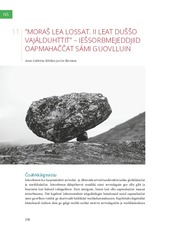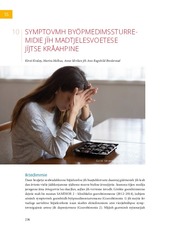Blar i forfatter "Silviken, Anne"
-
The association of religious factors with mental health-service utilisation and satisfaction in a mixed Sámi and Norwegian adult population: Adopting the SAMINOR 2 Questionnaire Survey
Kiærbech, Henrik; Broderstad, Ann Ragnhild; Silviken, Anne; Lorem, Geir F; Kristiansen, Roald Ernst; Spein, Anna Rita (Journal article; Tidsskriftartikkel; Peer reviewed, 2023-06-18)The Indigenous Sámi have poorer mental health than the majority population and fairly equal access to professional mental healthcare. Despite this condition, certain studies indicate that this group is underrepresented among the users of such services. Religion or spirituality (R/S) often influences mental health-service utilisation and satisfaction among other Indigenous peoples and ethnic minorities. ... -
Disordered eating in Sami and non-Sami Norwegian populations: the SAMINOR 2 Clinical Survey
Kvaløy, Kirsti; Melhus, Marita; Silviken, Anne; Brustad, Magritt; Sørlie, Tore; Broderstad, Ann Ragnhild (Journal article; Tidsskriftartikkel; Peer reviewed, 2017-12-10)<p><i>Objective</i>: The present study aimed to investigate disordered eating (DE) among Sami compared with non-Sami residing in northern Norway.</p> <p><i>Design</i>: In a cross-sectional design, stratified by sex and ethnicity, associations were tested between DE (Eating Disturbance Scale; EDS-5) and age, education level, BMI category, anxiety and depression, physical activity and consumption ... -
"If you do not birget [manage] then you don't belong here": a qualitative focus group study on the cultural meanings of suicide among Indigenous Sámi in arctic Norway
Stoor, Jon Petter Anders; Berntsen, Gro; Hjelmeland, Heidi Marie; Silviken, Anne (Journal article; Tidsskriftartikkel; Peer reviewed, 2019-01-24)Suicide is a major public health issue across the Arctic, especially among Indigenous Peoples. The aim of this study was to explore and describe cultural meanings of suicide among Sámi in Norway. Five open-ended focus group discussions (FGDs) were conducted with 22 Sámi (20) and non-Sámi (2) participants in South, Lule, Marka, coastal and North Sámi communities in Norway. FGDs were recorded, transcribed ... -
“Mapping suicide prevention initiatives targeting Indigenous Sámi in Nordic countries”
Stoor, Jon Petter A.; Eriksen, Heidi A.; Silviken, Anne (Journal article; Tidsskriftartikkel; Peer reviewed, 2021-11-07)Background - Suicide is a major public health issue among Indigenous Sámi in Nordic countries, and efforts to prevent suicide in the Sámi context are increasing. However, there is no literature on suicide prevention initiatives among Sámi. The aim of the study was to map suicide prevention initiatives targeting Sámi in Norway, Sweden, and Finland during 2005–2019.<p> <p>Method - Initiatives were ... -
The need for and barriers to professional help - a qualitative study of the bereaved in Sami areas
Dyregrov, Kari; Berntsen, Gro; Silviken, Anne (Journal article; Tidsskriftartikkel; Peer reviewed, 2014) -
Religion and Health in Arctic Norway–the association of religious and spiritual factors with suicidal behaviour in a mixed Sámi and Norwegian adult population - The SAMINOR 2 Questionnaire Survey
Kiærbech, Henrik; Silviken, Anne; Lorem, Geir F; Kristiansen, Roald E; Spein, Anna Rita (Journal article; Tidsskriftartikkel; Peer reviewed, 2021-07-12)Given the higher suicide rates among the adult population in the northernmost part of Norway and some unfavourable psychosocial outcomes associated with the Laestadian revival movement in this region, it is reasonable to investigate the relationship between religiosity/spirituality and suicidal behaviour in this context. This study used cross-sectional data from the population-based SAMINOR 2 ... -
Religion and Health In Arctic Norway—The association of religious and spiritual factors with non-suicidal self-injury in the Sami and non-Sami adult population—The SAMINOR 2 Questionnaire Survey
Kiærbech, Henrik; Silviken, Anne; Lorem, Geir F; Kristiansen, Roald E; Spein, Anna Rita (Journal article; Tidsskriftartikkel; Peer reviewed, 2021-07-05)Research has found psychological dimensions of religiosity/spirituality (R/S) beneficial against non-suicidal self-injury (NSSI), whereas the effect of R/S social aspects is less studied. Using data from the SAMINOR 2 Questionnaire Survey (2012, n = 10,717 ages 18–69; response rate: 27%; non-Sami: 66%; females: 55%), we examined the association of R/S—religious attendance, congregational affiliation, ... -
Rising Sun: Prioritized outcomes for suicide prevention in the Arctic
Collins, Pamela Y.; Delgado, Roberto A.; Apok, Charlene; Baez, Laura; Bjerregaard, Peter; Chatwood, Susan; Chipp, Cody; Crawford, Allison; Crosby, Alex; Dillard, Denise; Driscoll, David; Ericksen, Heidi; Hicks, Jack; Larsen, Christina Viskum Lytken; McKeon, Richard; Partapuoli, Per Jonas; Phillips, Anthony; Pringle, Beverly; Rasmus, Stacy; Sigurðardóttir, Sigrún; Silviken, Anne; Stoor, Jon Petter Anders; Sumarokov, Yury; Wexler, Lisa (Journal article; Tidsskriftartikkel; Peer reviewed, 2018-10-24)The Arctic Council, a collaborative forum among governments and Arctic communities, has highlighted the problem of suicide and potential solutions. The mental health initiative during the United States chairmanship, Reducing the Incidence of Suicide in Indigenous Groups: Strengths United Through Networks (RISING SUN), used a Delphi methodology complemented by face-to-face stakeholder discussions to ... -
A scoping review of Indigenous suicide prevention in circumpolar regions
Redvers, Jennifer; Bjerregaard, Peter; Eriksen, Heidi; Fanian, Sahar; Healey, Gwen; Hiratsuka, Vanessa; Jong, Michael; Larsen, Christina Viskum Lytken; Linton, Janice; Pollock, Nathaniel; Silviken, Anne; Stoor, Jon Petter A; Chatwood, Susan (Journal article; Tidsskriftartikkel; Peer reviewed, 2015-03-04)Background. Suicide is a serious public health challenge in circumpolar regions, especially among Indigenous youth. Indigenous communities, government agencies and health care providers are making concerted efforts to reduce the burden of suicide and strengthen protective factors for individuals, families and communities. The persistence of suicide has made it clear that more needs to be ... -
Socio-demographic, psychosocial and environmental factors associated with suicidal behaviour in Indigenous Sami and Greenlandic Inuit adolescents; the WBYG and NAAHS studies
Granheim, Ida Pauline Høilo; Silviken, Anne; Larsen, Christina Viskum Lytken; Kvernmo, Siv (Journal article; Tidsskriftartikkel; Peer reviewed, 2021-04-15)Background - For young Indigenous people, suicide is one of the leading causes of death, and high rates in Arctic areas indicate serious health- and societal concerns. More knowledge is needed, as suicidal behaviour predictslater death by suicide.<p> <p>Objectives - The objective was to study associations between suicidal thoughts and suicide attempts and socio-demographic, psychosocial, and ... -
"Sorg er tungt. Det er ikke bare å glemme" – Etterlatte ved selvmord i samiske områder
Silviken, Anne; Berntsen, Gro (Chapter; Bokkapittel, 2022-03-16)Selvmord er et betydelig samfunns- og folkehelseproblem globalt og nasjonalt. Selvmord forekommer også i samiske samfunn hvor flere bygder og familier er hardt rammet. Det er med andre ord mange etterlatte ved selvmord i Sápmi. Dette kapitlet setter søkelys på ulike utfordringer som etterlatte i samiske områder kan oppleve i møte med det lokale hjelpeapparatet. I kapitlet diskuteres utfordringer ... -
Sudden and unexpected death in Sami areas in Norway - A qualitative study of the significance of religiosity in the bereavement process
Silviken, Anne; Gundersen, Lena Slettli; Berntsen, Gro; Dyregrov, Kari (Journal article; Tidsskriftartikkel; Peer reviewed, 2015-03-18)Sudden and unexpected death represents a severe life event incorporating multiple stressors and is potentially more traumatizing than natural deaths. Religiosity is an important resource in everyday life and may be especially important during times of loss. The aim of this paper is to explore the significance of religiosity in the coping process after sudden death, using a qualitative semi-structural ... -
Symptomer på spiseforstyrrelser og fornøydhet med egen kropp
Kvaløy, Kirsti; Melhus, Marita; Silviken, Anne; Broderstad, Ann Ragnhild (Chapter; Bokkapittel, 2022-03-16)I dagens samfunn er overvekt og fedme hyppig forekommende og har derfor blitt mer akseptert i store deler av befolkningen. Samtidig fokuseres det i media på at idealet er å være slank, sunn og i god fysisk form. I to studier av deltakere i SAMINOR 2 – den kliniske undersøkelsen (2012–2014), var vi interessert i å studere symptomer på spiseforstyrrelser (Studie 1) og om underestimering av overvekt ... -
‘‘We are like lemmings’’: making sense of the cultural meaning(s) of suicide among the indigenous Sami in Sweden
Stoor, Jon Petter Anders; Kaiser, Niclas; Jacobsson, Lars; Renberg, Ellinor Salander; Silviken, Anne (Journal article; Tidsskriftartikkel; Peer reviewed, 2015-09-01)Background. Suicide is a widespread problem among indigenous people residing in the circumpolar Arctic. Though the situation among the indigenous Sami in northern Scandinavia is better than among some other indigenous people, suicide is still regarded as a major public health issue. To adapt prevention strategies that are culturally attuned one must understand how suicide is understood within ... -
Weight underestimation linked to anxiety and depression in a cross-sectional study of overweight individuals in a Sami and non-Sami Norwegian population: the SAMINOR Study
Kvaløy, Kirsti; Melhus, Marita; Silviken, Anne; Broderstad, Ann Ragnhild (Journal article; Tidsskriftartikkel; Peer reviewed, 2019-11-12)<i>Objectives</i>: Underestimation of overweight/obesity may prevent weight loss attempts, resulting in further weight gain and maintenance of overweight. Mental health benefits may nevertheless surpass negative consequences. Our main objective was to study the association between underestimation of overweight/obesity and symptoms of anxiety and depression in Sami and non-Sami populations.<p> < ...


 English
English norsk
norsk













